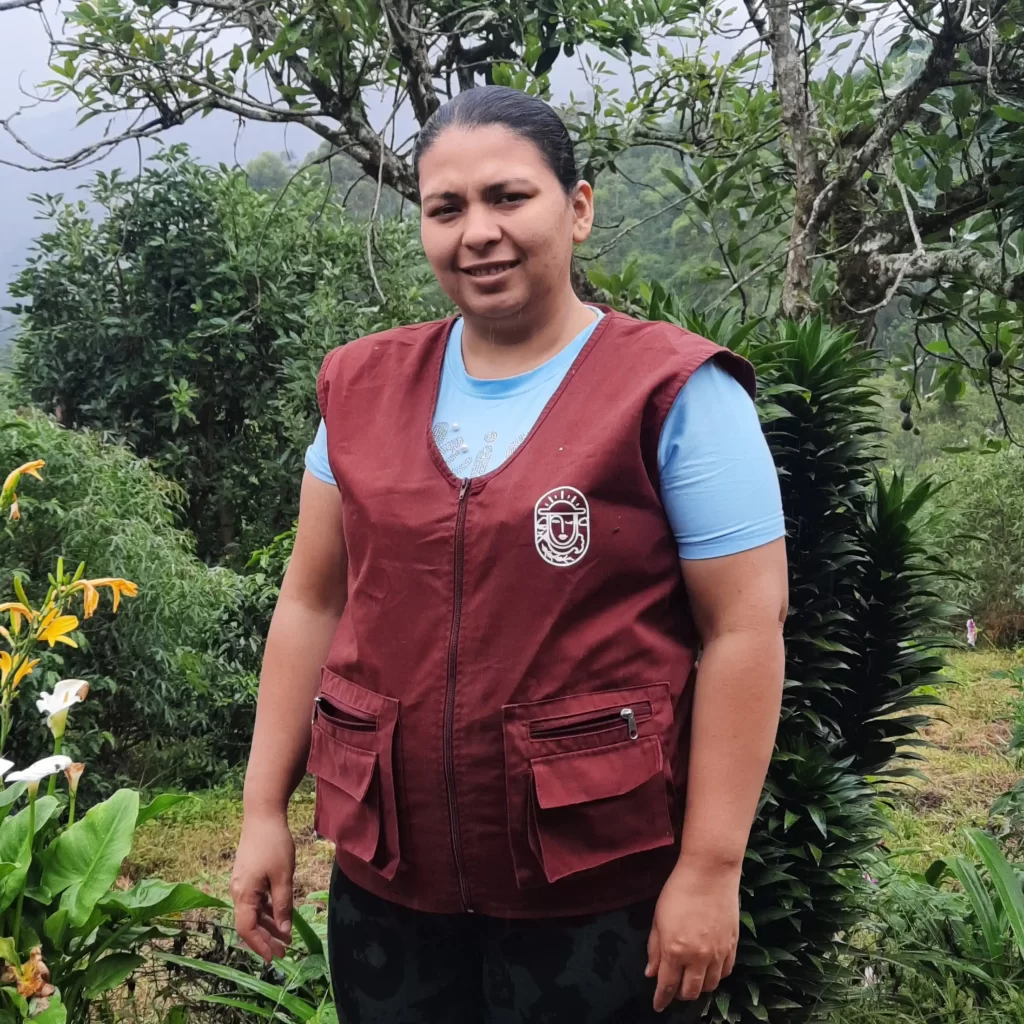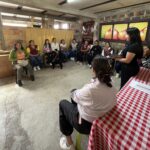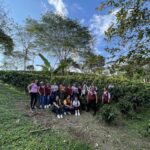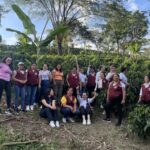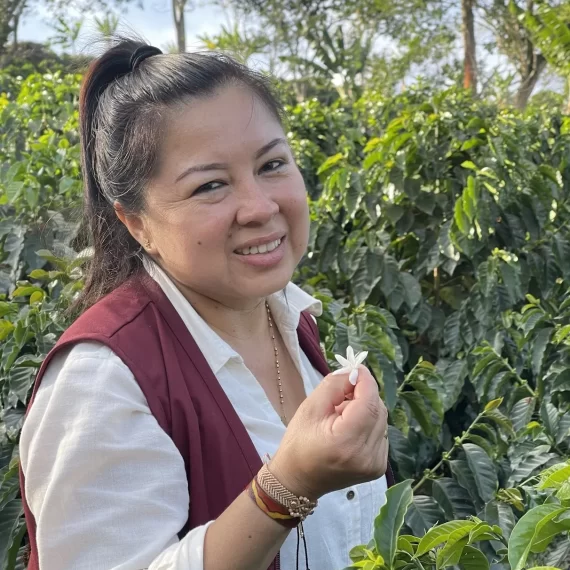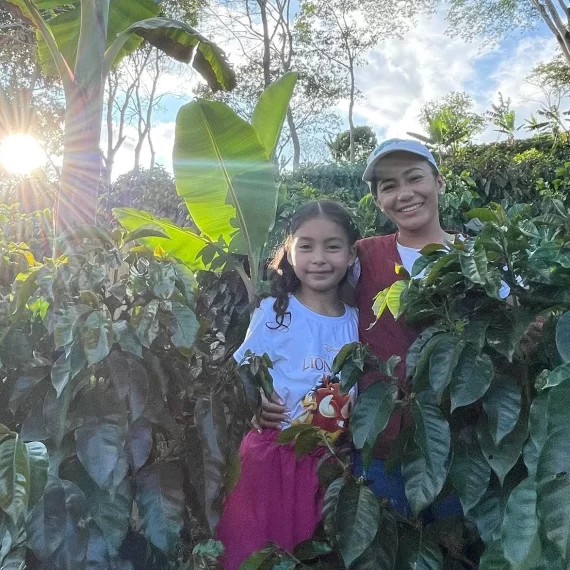
Luisa Fernanda Nieto
My name is Luisa Fernanda Nieto Zárate, and I am a chef who has been immersed in the fascinating world of coffee for the past four years. My journey began when I realized my desire to offer coffee of the highest quality. This ambition led me to modernize our farm and improve every detail of the production process. The three-hectare farm was acquired through family inheritance and loans, which enabled us to turn this dream into reality.
I decided to give our coffee a name that reflects the family effort and love we pour into every bean. Thus, “Kamilú” was born, a name that is an acronym of my family’s initials: Camilo, my husband; Milán, our son; and me, Luisa. “Kamilú” is not just a name but a symbol of our family’s unity and the dedication we have invested in this project.
I was also fortunate to become a member of Asogloriellas, an association of women coffee growers, where I gained invaluable knowledge. These experiences have been crucial in improving our practices and ensuring that “Kamilú” stands out not only for its flavor but also for its story.
Member of Asogloriellas
Gloriellas is an association of female farmers dedicated to growing and processing coffee with a focus on creating positive social, environmental, and economic impacts on their families and communities. The association was founded in 2023 as a response to the success of the “Campamento de Mujeres” project and has been growing ever since—from its 28 founding members to its current 42 members. Their goal is to expand to over 500 members from various regions of Colombia by 2030 and to become a recognized network of rural women promoting sustainable community development through quality, innovation, and collaboration.
Education is a core value of the association, as they see it as the pathway to continuously improving skills and knowledge in the field of coffee. The inspiration for Gloriellas is Ana Gloria Rodriguez, a Colombian coffee producer and the founder of the project, whose determination and vision continue to motivate other women in the coffee industry.
About the coffee
Every day on the farm is a new challenge and an opportunity to learn. I combine my love for cooking with my passion for coffee to create a unique product. This project is not just a business for me but a way to honor our land and offer others the very best we can grow. My goal is for every cup of “Kamilú” to reflect the effort, dedication, and love we pour into every stage of the process.
The process begins with fermentation, which takes place in plastic bags for 24 hours, during which the coffee cherries are left whole. After this period, the cherries are depulped, meaning the pulp surrounding the coffee beans is removed. The beans are then placed in plastic containers equipped with airlock valves that allow gases produced during fermentation to escape. In these containers, the coffee is fermented for 80 hours.
Once the fermentation is complete, the beans undergo a semi-washed process, during which the remaining pulp is partially removed from the coffee beans. Finally, the coffee is sun-dried in a traditional drying facility for 20 days. This drying process is crucial for achieving the right consistency and flavor of the final product.
The process begins with fermentation, which takes place in plastic bags for 36 hours. During this phase, the coffee cherries are left whole, allowing for natural fermentation. After this period, the cherries are depulped, meaning the removal of the pulp that surrounds the coffee beans.
The depulped coffee beans are then placed into plastic containers equipped with special airlock valves. These valves allow gases produced during the next fermentation stage to escape. This stage lasts for 80 hours and is crucial for developing the specific flavors and aromas in the coffee beans.
After completing this fermentation phase, the beans undergo a semi-washed process, during which the remaining pulp is partially removed. The process concludes with sun drying, carried out in a traditional drying facility over 20 days. This drying step is essential for achieving the optimal consistency and distinctive flavor of the final coffee product.
The process begins with fermentation, which takes place in plastic bags for 36 hours. During this phase, the coffee cherries are left whole, allowing for natural fermentation. After this period, the cherries are pulped, meaning the removal of the pulp surrounding the coffee beans.
Next, the pulped coffee beans are placed into plastic containers equipped with special air-release valves. These valves allow gases produced during the subsequent fermentation, which lasts 80 hours, to escape. This step is crucial for developing the specific flavors and aromas in the coffee beans.
After the fermentation is complete, a semi-washed process follows, during which the remaining pulp on the coffee beans is partially removed. However, enough pulp remains on the beans. Finally, the coffee is sun-dried in a traditional dryer for 20 days. This drying process is essential for achieving the proper consistency and flavor of the final product.
The process begins with fermentation, which takes place in plastic bags for 24 hours, during which the coffee cherries are left whole. After this period, the cherries are pulped, meaning the removal of the pulp surrounding the coffee beans. The beans are then placed into plastic containers equipped with air-release valves, which allow gases produced during fermentation to escape. In these containers, the coffee is left to ferment for 80 hours.
After the fermentation is complete, a semi-washed process follows, during which the remaining pulp on the coffee beans is partially removed. However, enough pulp remains on the beans. Finally, the coffee is sun-dried in a traditional dryer for 20 days. This drying process is essential for achieving the proper consistency and flavor of the final product.


